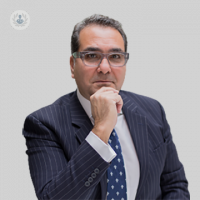Expert advice: Trying for a baby and when to see a specialist
Written by:Unsuccessful attempts to conceive can understandably leave couples looking to start a family disappointed and distressed. In this informative article, highly respected consultant in reproductive medicine Professor Rami Wakim offers invaluable advice for how couples on maximising their chances of getting pregnant. He also offers expert insight on when the couples should see a specialist about conception problems and factors that can affect fertility levels.

How can couples trying for a baby monitor their fertility levels at home?
These days, there are quite a few technological devices which can help couples to monitor their fertility levels at home. Starting with the female partner, the easiest way to pinpoint the time of ovulation is by using an ovulation kit, which can be bought from any pharmacy. There are many of these kits on the market and they are very efficient in detecting the exact right time of the LH (luteinising hormone) surge. Before the ovulation can occur, the body experiences a surge of this type of hormone. It peaks and then the ovulation follows, between twenty-four and thirty-six hours later.
It is commonly known that couples should aim to have sexual relations before the ovulation occurs as the sperm will wait for the egg but the egg won’t wait for the sperm, so being aware of when the woman is ovulating is key.
Other signs that ovulation has occurred are the presence of cervical mucus and pain. These indicators can be used by couples to select the best timing to try for a baby.
Additionally, there are numerous apps for women which track their menstrual cycle and ovulation time. Previously, women often measured their basal (at rest) temperature but we don’t tend to recommend this anymore as the more innovative methods are simpler to use.
Men can undergo a simple test to establish sperm count, also known as a spermogram. This can be done at a lab or a fertility centre. If the test finds normal sperm in the male and the ovulation can also be accounted for in the female partner, the couple can try at home, without the need to see a specialist, with the assistance of ovulation monitoring to choose the best timing for three to six months.
How long should couples try to conceive before seeing a doctor if they are not successful?
There are some important factors to consider when giving couples guidance on how long they should try at home before seeing a specialist. These factors relate to the age of the couple and if their medical history could have an impact; for instance, untreated sexually transmitted infections or surgery in the reproductive area, such as to remove ovarian cysts.
If the couple are younger than thirty-five and they have no relevant medical history, as per NHS and NICE guidelines, we say that couples should seek advice after one year of unprotected intercourse without success in conceiving. It is very important to note that this should be as consistent as possible throughout the whole year. Couples should engage in sexual relations around the ovulation time consecutively in every month without taking holidays or breaks. Eighty per cent of couples conceive within the first year of trying in this way, so if after this period the couple is unsuccessful, they should consult a specialist.
What are the most likely causes of fertility problems in an otherwise healthy couple?
When establishing the cause of fertility issues, I take a ‘back to basics’ approach. The couple’s health, the male’s sperm count and the female’s ovulation time, as well as other factors, all have to be considered. In an otherwise healthy couple, it’s possible that we wouldn’t know about pre-existing issues with the uterine anatomy. It is possible, for example, that the woman may have congenital anomalies in her uterus that are only identified when she has trouble getting pregnant. A simple scan can detect abnormalities such as these if we suspect that this may be a factor in unsuccessful attempts to get pregnant.
It is also important to consider the tubal factor, which relates to the woman’s fallopian tubes being scarred, damaged or blocked, which affects the conception process. People often forget someone that previous abdominal surgery can affect this, such as surgery to remove a ruptured appendix in childhood, a past pelvic infection or a previous caesarean section. Otherwise, the woman may be healthy but a history including procedures such as these brings risk factors. Therefore, we need to detect if they are affecting the tubal factor.
Also, we have to consider the woman’s general health. Chronic medical conditions, such as lupus or diabetes, should be monitored and well controlled (or in remission, if this is possible) to optimise her condition. All of these factors should be well controlled before starting.
I would stress also that controlling smoking and alcohol habits as well as maintaining a healthy diet and an ideal weight can contribute to a successful outcome. In all cases, we need to have a clear picture of the best scenario for the patient to try for this pregnancy to occur. When this has been established and tried, we can look at other options if they are not successful.
If you are concerned about fertility problems, you can book a consultation with Professor Wakim by visiting his Top Doctors profile.


